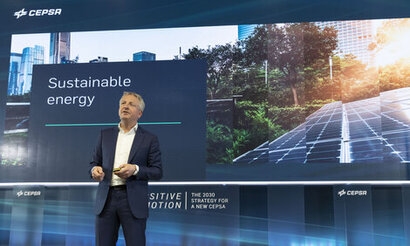
Cepsa presented its new 2030 Strategy, 'Positive Motion' yesterday, aiming to become a leader in sustainable mobility and energy in Spain and Portugal, and a benchmark in energy transition. With this strategy, the company will focus on the needs of its customers, who face their own challenges in decarbonising their activities.
The company will invest between 7 billion and 8 billion euros this decade, of which more than 60 percent will be allocated to sustainable businesses as of 2023. This will translate into a greater contribution of sustainable businesses to earnings before interest, taxes, depreciation, and amortisation (EBITDA), rising from 14 percent in 2022 to more than half in 2030.
“At Cepsa, we are embarking on an ambitious journey to transform our company and be a key driver and enabler of the energy transition” said Maarten Wetselaar, CEO of Cepsa. “Cepsa is small enough to move fast yet big enough to be a leader in creating a greener, more just and more sustainable economy. We will partner with our customers to develop decarbonization solutions for their energy needs, and of course address our own footprint as well. Green molecules are essential for the decarbonization of complex sectors such as heavy transport, aviation and maritime traffic and Cepsa has a competitive advantage thanks to its many years of experience in the production and handling of this energy source.”
Cepsa wants to go beyond net zero to Net Positive, enabling customers and society to move in the right direction. The company has set an ambitious roadmap to cut its emissions, placing itself among the benchmark companies in its sector. Specifically, by 2030, it aims to reduce its CO2 emissions (Scope 1 and 2) by 55 percent compared to 2019 and become carbon neutral by 2050. As for Scope 3, the carbon intensity of its products will be reduced by between 15-20 percent in 2030.
The company's new business ethos ('Positive Motion') will be structured under two ecosystems: Sustainable Mobility & New Commerce, and Sustainable Energy. Both divisions will be fuelled by its Energy Parks and alliances with strategic partners.
Under Cepsa's new strategy, the decarbonisation of road transport and end-customer mobility will play a key role. The company will build the largest e-mobility ecosystem in Spain and Portugal, together with Endesa, that will meet customers’ charging needs whether at home or on the road. The plan will create an ultra-fast, on-the-go charging network with at least one 150 kW charger every 200 kilometres on key inter-city corridors.
It will also foster demand for green hydrogen in commercial road transport by placing hydrogen refuelling stations every 300 kilometres across all the main road transport corridors connecting Spain to Europe by 2030.
Cepsa will also focus on accelerating the decarbonisation of customers in industry, air and maritime transport, as well as the company itself through the production of green molecules, primarily renewable hydrogen and biofuels.
Cepsa, currently one of the main producers of hydrogen in Spain, is aiming to lead green hydrogen production in Spain and Portugal by 2030 with a capacity equivalent to 2 GW, becoming a key player in the import and export of this energy between Europe, Africa and the Middle East based on the strategic location of its facilities on the Iberian Peninsula.
Similarly, its deep experience in energy production and supply and its technological know-how will drive the company’s attempts to lead second-generation biofuels production of 2.5 million tons per year by 2030, thus promoting the circular economy. In this area, Cepsa aims to become a leading supplier of Sustainable Aviation Fuel (SAF) with an annual production of 0.8 million tons. Cepsa currently supplies 35 percent of the Spanish aviation sector’s energy needs.
Alongside the conversion of its traditional refineries into diversified and sustainable Energy Parks, Cepsa will develop a portfolio of solar and wind energy projects mostly dedicated to its own use. These renewable energy projects will have a capacity of 7 GW, of which 1.5 GW are already connected to the grid.
For additional information:

